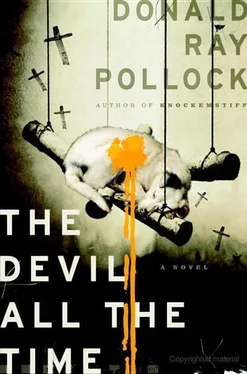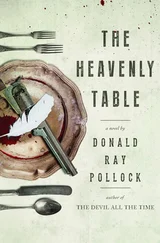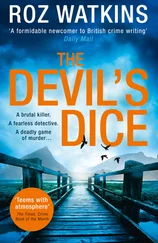Four hours later, about fifty miles outside of Charleston, West Virginia, the Bel Air began making a thumping noise underneath. He managed to get off the highway and into a filling station lot before the transmission went out completely. He got down on his hands and knees and watched the last of the fluid drip from the casing. “Motherfucker,” he said. Just as he started to get up, a thin man in baggy blue coveralls came out and asked if he needed any help. “Not unless you got a transmission you can put in this thing,” Arvin said.
“She went out on ye, huh?”
“It’s shot,” Arvin said.
“Where you headed?”
“Michigan.”
“You welcome to use the phone if you want to call someone,” the man said.
“Ain’t no one to call.” As soon as he said it, Arvin realized how true that statement really was. He thought for a minute. Though he hated the thought of giving the Bel Air up, he had to keep moving. He was going to have to make a sacrifice. He turned to the man and tried to smile. “How much would you give me for her?” he asked. The man glanced at the car and shook his head. “I got no use for it.”
“The engine’s good. I just changed the points and plugs a couple days ago.”
The man began walking the Chevy, kicking the tires, checking for putty. “I don’t know,” he said, rubbing the gray stubble on his chin.
“How about fifty bucks?” Arvin said.
“It ain’t hot, is it?”
“The title’s in my name.”
“I’ll give you thirty.”
“Is that the best you can do?”
“Sonny, I got five kids at home,” the man said.
“Okay, it’s yours,” Arvin said. “Just let me get my stuff.” He watched the man go back inside the station. He took his bag out of the trunk and then sat down in the car one last time. The day he’d bought it, he and Earskell had burned up a whole tank of gas riding around, drove clear over to Beckley and back. He had a sudden feeling that he was going to lose a lot more before this was over. Reaching under the dash, he got the Luger, stuck it in his waistband. Then he took the title and a box of shells from the glove compartment. When he went inside, the man laid the thirty dollars on the counter. Arvin signed the title and dated it, then put the money in his wallet. He bought a Zagnut and a bottle of RC Cola. It was the first he’d eaten or drunk since the coffee that morning in his grandmother’s kitchen. He looked out the window at the endless stream of cars going by on the highway while he chewed on the candy bar. “You ever hitchhike?” he asked the man.
ROY FINISHED PICKING ORANGES THAT DAY around five o’clock and collected his pay, which was thirteen dollars. He went to the store at the intersection and bought half a pound of pickle loaf and half a pound of cheese and a loaf of rye bread and two packs of Chesterfields and three fifths of White Port. It was nice getting paid every day. He felt like a rich man walking back to the spot where he and Theodore were camping. The boss was the best one he’d ever had, and Roy had been picking steady for three weeks. The man had told him today that there was maybe only another four or five days of work left. Theodore would be glad to hear that. He wanted to get back to the ocean awful bad. They had put away almost a hundred dollars in the last month, more money than they had had in a long, long time. Their plan was to buy some decent clothes and start preaching again. Roy thought they could find a couple of suits at the Goodwill for maybe ten or twelve bucks. Theodore couldn’t play the guitar like he used to, but they could get along all right.
Roy crossed a drainage ditch and headed for their campsite under a small stand of stunted magnolia trees. He saw Theodore asleep on the ground next to his wheelchair, his guitar lying beside him. Roy shook his head and pulled out one of the bottles of wine and a pack of the smokes. He sat down on a stump and took a drink before he lit a cigarette. He had killed half the fifth before he finally noticed that the cripple’s face was crawling with ants. Rushing to his side, Roy rolled him over on his back. “Theodore? Hey, come on, buddy, wake up,” Roy pleaded, shaking him and slapping at the bugs. “Theodore?”
As soon as he tried to lift the man, Roy knew that he was dead, but he still struggled for fifteen minutes to get him back up in the wheelchair. He began pushing him through the sandy soil toward the highway, but went only a few feet before he stopped. The authorities would ask a lot of questions, he thought, as he watched a fancy car pass by in the distance. He looked around at the campsite. Maybe it would be better just to stay here. Theodore loved the ocean, but he liked the shade, too. And this grove of trees was as much a home as anything they’d had since their days with Bradford Amusements.
Roy sat down on the ground beside the wheelchair. They had done a lot of bad things over the years, and he spent the next several hours praying for the cripple’s soul. He hoped someone would do the same for him when it came his time. Around sundown, he finally got up and fixed himself a sandwich. He ate part of it and tossed the rest in the weeds. Halfway through another cigarette, it dawned on him that he didn’t have to run anymore. He could go back home now, turn himself in. They could do whatever they wanted to, as long as he got to see Lenora one more time. Theodore had never been able to understand that, how Roy could miss somebody he didn’t really know. It was true that he could barely recall what his little girl’s face had looked like, but even so, he had wondered a thousand times how her life had turned out. By the time he finished the smoke, he was already rehearsing some words he would say to her.
That night, he got drunk with his old friend one last time. He built a fire and talked to Theodore like he was still alive, told the same stories over again, the ones about Flapjack, and the Flamingo Lady, and the Zit-Eater, and all those other lost souls they had run into on the road. Several times he caught himself waiting on Theodore to laugh or add something that he’d forgotten. After a few hours, there were no more tales to tell, and Roy felt lonelier than he had ever felt in his life. “Hell of a long way from Coal Creek, ain’t it, boy?” was the last thing he said before he lay down on his blanket.
He woke right before dawn. He wet a rag with some water from the gallon jug they always kept tied to the back of the wheelchair. He wiped the grime off Theodore’s face and combed his hair, pressed his eyes shut with his thumb. There was a splash of wine left in the last bottle and he set it in the cripple’s lap, placed his ragged straw hat on his head. Then Roy wrapped his few belongings in a blanket and stood with his hand on the dead man’s shoulder. He closed his eyes and said a few more words. He realized that he would never preach again, but that was all right. He’d never been much good at it anyway. Most people just wanted to hear the cripple play. “I wish you was going with me, Theodore,” Roy said. By the time he managed to catch a ride, he was already two miles down the road.
THANK GOD, JULY WAS COMING TO AN END. Carl could hardly wait to get out on the road again. He hauled the two jars filled with Sandy’s tips to the bank and turned it into paper money, then spent the next few days leading up to the vacation buying supplies — two new outfits and some frilly underwear from JC Penney for Sandy, a gallon of motor oil, spare spark plugs, a hacksaw he found on sale and bought on a whim, fifty feet of rope, a set of road maps of the southern states from the AAA office, two cartons of Salem, and a dozen dog dicks. By the time he finished shopping and had a mechanic put a set of brake pads on the car, they were down to $134, but that would take them far. Hell, he thought, as he sat at the kitchen table and counted again, they could live like kings for a week on this much money. He recalled the summer two years ago, when they had left Meade with $40. It was potted meat and stale chips and siphoned gas and sleeping in the sweltering car the whole way, but they had managed to stay out sixteen days with the money they scrounged off the models. Compared to that, they were in fine shape this time.
Читать дальше












